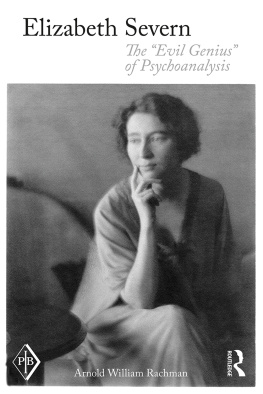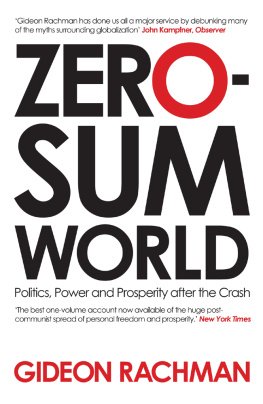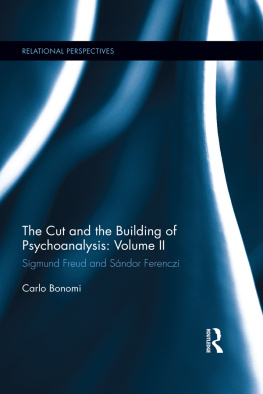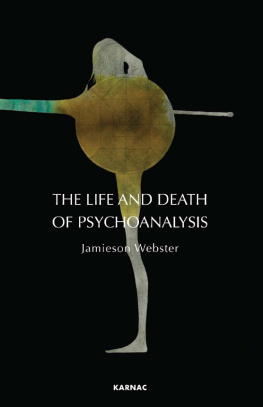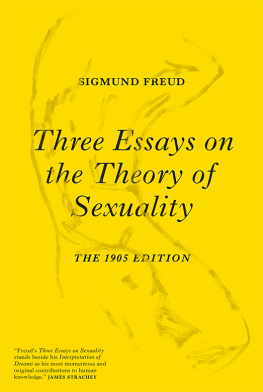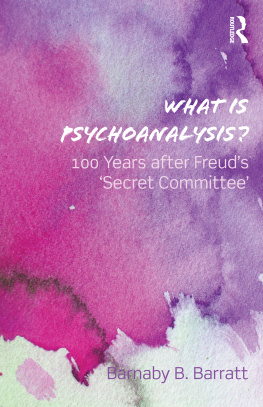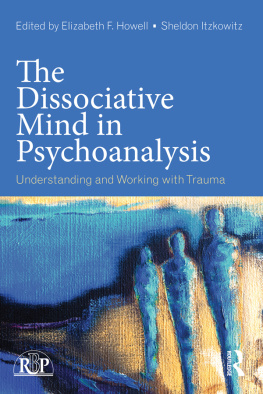ELIZABETH SEVERN
Elizabeth Severn: The Evil Genius of Psychoanalysis chronicles the life and work of Elizabeth Severn, both as one of the most controversial analysands in the history of psychoanalysis and as a psychoanalyst in her own right. Condemning her as an evil genius, Freud disapproved of Severns work and had her influence expelled from the psychoanalytic mainstream. In this book, Arnold William Rachman draws on years of research into Severn to present a much-needed reappraisal of her life and work, as well as her contribution to modern psychoanalysis.
Rachmans re-discovery, restoration, and analysis of The Elizabeth Severn Papers including previously unpublished interviews, papers, books, brochures, and photographs suggests that, far from a failure, the analysis of Severn by Sndor Ferenczi constitutes one of the great cases in psychoanalysis, one that was responsible for a new theory and methodology for the study and treatment of trauma disorder, in which Severn played a pioneering role.
Elizabeth Severn should be of interest to any psychoanalyst looking to shed fresh light on Severns progressive views on clinical empathy, self-disclosure, countertransference analysis, intersubjectivity, and the origins of relational analysis.
Arnold William Rachman is a licensed psychologist, trained psychoanalyst, and Fellow of the American Group Psychotherapy Association.
PSYCHOANALYTIC INQUIRY BOOK SERIES
JOSEPH D. LICHTENBERG
Series Editor

Like its counterpart, Psychoanalytic Inquiry: A Topical Journal for Mental Health Professionals, the Psychoanalytic Inquiry Book Series presents a diversity of subjects within a diversity of approaches to those subjects. Under the editorship of Joseph Lichtenberg, in collaboration with Melvin Bornstein and the editorial board of Psychoanalytic Inquiry, the volumes in this series strike a balance between research, theory, and clinical application. We are honored to have published the works of various innovators in psychoanalysis, including Frank Lachmann, James Fosshage, Robert Stolorow, Donna Orange, Louis Sander, Lon Wurmser, James Grotstein, Joseph Jones, Doris Brothers, Fredric Busch, and Joseph Lichtenberg, among others.
The series includes books and monographs on mainline psychoanalytic topics, such as sexuality, narcissism, trauma, homosexuality, jealousy, envy, and varied aspects of analytic process and technique. In our efforts to broaden the field of analytic interest, the series has incorporated and embraced innovative discoveries in infant research, Self Psychology, intersubjectivity, motivational systems, affects as process, responses to cancer, borderline states, contextualism, postmodernism, attachment research and theory, medication, and mentalization. As further investigations in psychoanalysis come to fruition, we seek to present them in readable, easily comprehensible writing.
After more than 25 years, the core vision of this series remains the investigation, analysis and discussion of developments on the cutting edge of the psychoanalytic field, inspired by a boundless spirit of inquiry. A full list of all the titles available in the Psychoanalytic Inquiry Book Series is available at https://www.routledge.com/Psychoanalytic-Inquiry-Book-Series/book-series/LEAPIBS.
ELIZABETH SEVERN
THE EVIL GENIUS OF PSYCHOANALYSIS
Arnold William Rachman

First published 2018
by Routledge
2 Park Square, Milton Park, Abingdon, Oxon OX14 4RN
and by Routledge
711 Third Avenue, New York, NY 10017
Routledge is an imprint of the Taylor & Francis Group, an informa business
2018 Arnold William Rachman
The right of Arnold William Rachman to be identified as author of this work has been asserted by him in accordance with sections 77 and 78 of the Copyright, Designs and Patents Act 1988.
All rights reserved. No part of this book may be reprinted or reproduced or utilised in any form or by any electronic, mechanical, or other means, now known or hereafter invented, including photocopying and recording, or in any information storage or retrieval system, without permission in writing from the publishers.
Trademark notice : Product or corporate names may be trademarks or registered trademarks, and are used only for identification and explanation without intent to infringe.
British Library Cataloguing-in-Publication Data
A catalogue record for this book is available from the British Library
Library of Congress Cataloging-in-Publication Data
A catalog record for this book has been requested
ISBN: 978-1-138-12286-4 (hbk)
ISBN: 978-1-138-12287-1 (pbk)
ISBN: 978-1-315-64922-1 (ebk)
Typeset in Bembo
by Deanta Global Publishing Services, Chennai, India

Picture of Sndor Ferenczi, 1925, given to Elizabeth Severn with the inscription: To Dr. Elizabeth Severn as a token of high consideration. Budapest, December 1925. S. Ferenczi

Severns dedication from her 1920 book, The Psychology of Behavior , which shegave to Sndor Ferenczi in July 1925, written in her own handwriting with the inscription: With appreciation to one who can still find fragrance in the garlands of former years, S. Ferenczi. From his grateful pupil, Elizabeth Severn, Budapest July 9, 1925
CONTENTS
These are the 19 images used in the book, Elizabeth Severn: The Evil Genius of Psychoanalysis , taken from The Elizabeth Severn Papers, which are the literary property of Arnold William Rachman.
As a mother comforts her son, so will I comfort you. (Isiah 66:13)
Laws which prescribe that everyone must believe and forbid men to say or write against this or that opinion, are often passed to gratify, or rather to appease the anger of those who cannot abide independent minds. (Baruch Spinoza)
When people come to you for help, do not turn them off with pious words, saying Have faith and take your troubles to God! Act instead as though there were no God, as though there were only one person in the world who could help only yourself. (Martin Buber)
I do not know of any analyst whose analysis I could declare, theoretically, as concluded (least of all my own). Thus we have, in every single analysis, quite enough to learn about ourselves. (Sndor Ferenczi)
I wish here to emphasize the difference between the accepted psycho-analytic mode of treatment which is purely dissecting in nature and a method [that] does not scorn to play mother to the injured one and which encourages the full reproduction of the emotions and feeling-tone of the traumatic period under different and better communications it takes above all an emotional capacity or gift on the part of the analyst, who unless he can do this, is not a true physician to the soul. (Elizabeth Severn)
Arnold William Rachman, PhD, FAGPA:
Member, Board of Directors, The Sndor Ferenczi Center NYC
The New School for Social Research, NYC
Honorary Member The Sndor Ferenczi Society, Budapest, Hungary
Donor The Elizabeth Severn Papers, the Library of Congress, Washington, DC
Author

